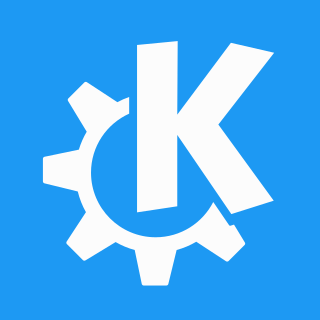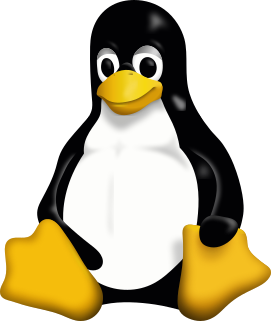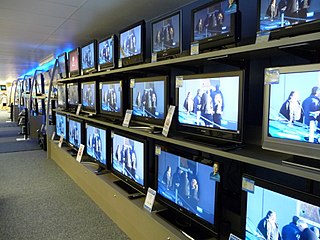TiVo is a digital video recorder (DVR) developed and marketed by TiVo Corporation and introduced in 1999. TiVo provides an on-screen guide of scheduled broadcast programming television programs, whose features include "Season Pass" schedules which record every new episode of a series, and "WishList" searches which allow the user to find and record shows that match their interests by title, actor, director, category, or keyword. TiVo also provides a range of features when the TiVo DVR is connected to a home network, including film and television show downloads, advanced search, personal photo viewing, music offerings, and online scheduling.

The GNU Project is a free-software, mass-collaboration project, first announced on September 27, 1983 by Richard Stallman at MIT. Its aim is to give computer users freedom and control in their use of their computers and computing devices, by collaboratively developing and providing software that is based on the following freedom rights: users are free to run the software, share it, study it and modify it. GNU software guarantees these freedom-rights legally, and is therefore free software; the use of the word "free" always being taken to refer to freedom.
A digital video recorder (DVR) is an electronic device that records video in a digital format to a disk drive, USB flash drive, SD memory card, SSD or other local or networked mass storage device. The term includes set-top boxes with direct to disk recording, portable media players and TV gateways with recording capability, and digital camcorders. Personal computers are often connected to video capture devices and used as DVRs; in such cases the application software used to record video is an integral part of the DVR. Many DVRs are classified as consumer electronic devices; such devices may alternatively be referred to as personal video recorders (PVRs), particularly in Canada.
Video4Linux, V4L for short, is a collection of device drivers and an API for supporting realtime video capture on Linux systems. It supports many USB webcams, TV tuners, and related devices, standardizing their output, so programmers can easily add video support to their applications. MythTV, tvtime and TVHeadend are typical applications that use the V4L framework.

A TV tuner card is a kind of television tuner that allows television signals to be received by a computer. Most TV tuners also function as video capture cards, allowing them to record television programs onto a hard disk much like the digital video recorder (DVR) does.
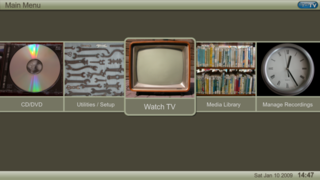
MythTV is a free and open-source home entertainment application with a simplified "10-foot user interface" design for the living room TV. It turns a computer with the necessary hardware into a network streaming digital video recorder, a digital multimedia home entertainment system, or home theater personal computer. It can be considered a free and open-source alternative to TiVo or Windows Media Center. It runs on various operating systems, primarily Linux, macOS, and FreeBSD.
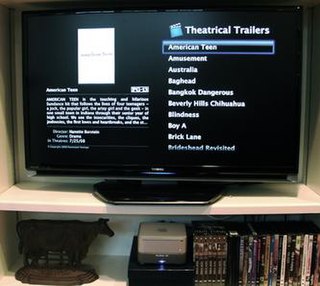
A home theater PC (HTPC) or media center computer is a convergence device that combines some or all the capabilities of a personal computer with a software application that supports video, photo, audio playback, and sometimes video recording functionality. In recent years, other types of consumer electronics, including gaming systems and dedicated media devices have crossed over to manage video and music content. The term "media center" also refers to specialized application software designed to run on standard personal computers.

Hauppauge Computer Works is a US manufacturer and marketer of electronic video hardware for personal computers. Although it is most widely known for its WinTV line of TV tuner cards for PCs, Hauppauge also produces personal video recorders, digital video editors, digital media players, hybrid video recorders and digital television products for both Windows and Mac. The company is named after the hamlet of Hauppauge, New York, in which it is based.

Kontact is a personal information manager and groupware software suite developed by KDE. It supports calendars, contacts, notes, to-do lists, news, and email. It offers a number of inter-changeable graphical UIs all built on top of a common core.

Dreambox is a series of Linux-powered DVB satellite, terrestrial and cable digital television receivers, produced by German multimedia vendor Dream Multimedia.
xawtv is software for watching and recording television and webcams with either a TV tuner or a Satellite receiver card (DVB-S). xawtv works on Unix-like operating systems, and is licensed under the GPL.
A desktop environment is a collection of software designed to give functionality and a certain look and feel to an operating system.
This is a comparison of digital video recorder (DVR), also known as personal video recorder (PVR), software packages. Note: this is may be considered a comparison of DVB software, not all listed packages have recording capabilities.
HDHomeRun is a network-attached digital television tuner box, produced by the company SiliconDust USA, Inc..

Kdenlive (KDE Non-Linear Video Editor) is a free and open-source video editing software based on the MLT Framework, KDE and Qt. The project was started by Jason Wood in 2002, and is now maintained by a small team of developers.
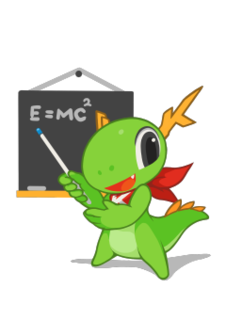
The KDE Education Project develops free educational software based on the KDE technologies for students and parents. These educational software is translated into more than 65 languages, so that users can access them without any problems. The KDE-Edu project also provides free software educational to support and facilitate teachers in planning lessons.
The Vu+, is a series of Linux-powered DVB satellite, terrestrial digital television receivers, produced by Korean multimedia brand Ceru Co., Ltd..
